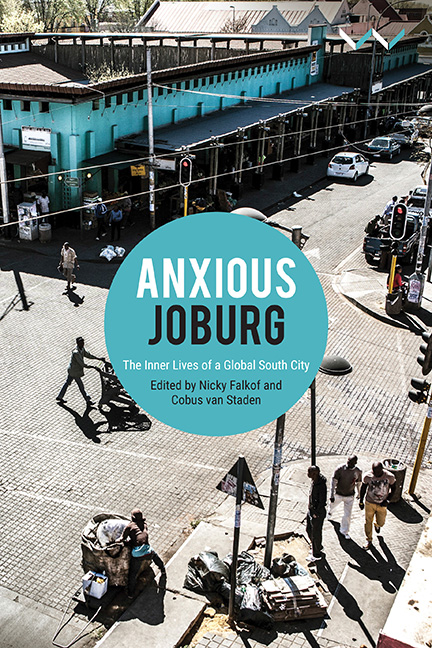Book contents
3 - Driving, Cycling and Identity in Johannesburg
Published online by Cambridge University Press: 16 June 2021
Summary
Mobility in Johannesburg plays an outsize role in the everyday practices and imaginaries of residents. Every aspect of movement invites scrutiny, rendering it a social activity that commands the attention of all residents – albeit in ways that are shaped by demographic differences. For instance, people living in informal settlements and townships located on the outskirts of the city have a ‘higher percentage of trips taking longer than one hour’ to reach their destinations. In contrast, data suggest ‘that residents of suburban locations are most “time-advantaged”’ (Venter and Badenhorst 2014, 47). Like travel times, experiences and perceptions of mobility are varied. Yet public narratives are often suffused with, to use Meshack Khosa‘s (1998) expression, ‘the travail of travelling’. This is, for example, manifest in traffic reports delivered by radio stations. Such reporting is more often than not concerned with difficulties in movement, discussing traffic congestion and traffic light outages. This way of representing mobility dovetails with other public narratives which evoke themes of anxiety. In such portrayals, the social world as well as the technologies and infrastructures of mobility is framed in terms of risk: users are depicted as encountering road rage, crime, potholed roads, poorly maintained buses and trains, errant minibus taxi drivers and more. Whether these and other anxieties about mobility in Johannesburg correspond precisely to objective reality is uncertain. The concern of this chapter is to explore how these anxieties shape transport behaviour and shed light on social dynamics in the city.
There have been numerous studies on this subject. Along with other rational-instrumental categories such as cost and time, anxieties over the risks of road safety and crime have been shown to shape transport behaviour. One travel survey showed that 6.8 per cent and 3.6 per cent of households within the Johannesburg municipality cited fear of accidents and crime respectively as the most important factors shaping their travel modes. In the same survey, 44.4 per cent of respondents who had not used a minibus taxi in the previous month reported that this had to with service attributes, a broad category that includes concerns about crime, driver behaviour and road safety (Statistics SA 2015, 78, 82).
Anxieties over transportation present differently according to socio-economic background. In another survey, people in high-income brackets indicated that concerns over personal safety were their main reason for not using public transport.
- Type
- Chapter
- Information
- Anxious JoburgThe Inner Lives of a Global South City, pp. 64 - 86Publisher: Wits University PressPrint publication year: 2020



